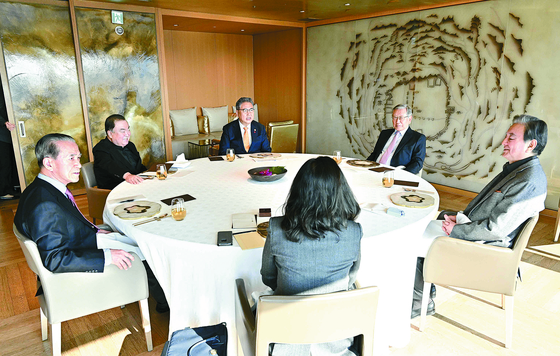Top envoy asks experts how to restore ties with Tokyo
![Foreign Minister Park Jin, third from left, clockwise, meets with a group of experts on Korea-Japan relations at an undisclosed location in Seoul on Tuesday. [NEWS1]](https://koreajoongangdaily.joins.com/data/photo/2022/12/07/7da5284f-d522-44d9-b658-4ea87d25379a.jpg)
Foreign Minister Park Jin, third from left, clockwise, meets with a group of experts on Korea-Japan relations at an undisclosed location in Seoul on Tuesday. [NEWS1]
Foreign Minister Park Jin met with experts on Japan Tuesday to find a way to improve deeply troubled relations.
“The experts suggested that Korea should establish a separate framework for discussion on issues at conflict between Korea and Japan, such as those on forced labor,” a Foreign Ministry official told the JoongAng Ilbo on Tuesday, “and another on strengthening trust for cooperation between Korea and Japan and among Korea and the United States and Japan.”
Park met with Yoo Heung-soo, chairman of the board of the Korea-Japan Friendship Association and former Korean ambassador to Japan; Moon Hee-sang, former National Assembly speaker; Choi Sang-yong, former Korean ambassador to Japan; and Hong Seok-hyun, chairman of JoongAng Holdings and former ambassador to the United States.
All had contributed to “meaningful efforts” to improve relations with Japan, said the official from Foreign Ministry.
Hong’s Korea Peace Foundation has been running a Korea-Japan forum for the past three years to discuss diplomatic solutions to the nations’ differences on historical issues.
In 2019, when he was National Assembly speaker, Moon promoted the idea of creating a fund by Japanese and Korean companies to compensate Korean victims of Japanese forced labor during the annexation of Korea by Japan (1910-45).
The meeting Tuesday was one in a projected series the ministry will host with experts, policymakers and victims of forced labor.
“We will be listening to the opinions of the victims and other people from all walks of life in order to seek reasonable solutions on current problems with Japan to improve relations,” the Foreign Ministry said.
The diplomatic spat between Tokyo and Seoul on Korean victims of Japanese wartime forced labor dates to 2018.
On Oct. 30, 2018, the Korean Supreme Court ordered Nippon Steel & Sumitomo Metal, renamed Nippon Steel, to pay 100 million won ($75,630) each to Korean victims of Japanese forced labor. It made a similar ruling on Nov. 29, 2018 against Mitsubishi Heavy Industries.
Japan protested the decisions, claiming that all compensation issues related to its colonial rule were resolved with a 1965 treaty normalizing bilateral relations.
Nippon Steel and Mitsubishi refused to comply with the rulings, leading to a drawn-out legal process.
The Supreme Court of Korea has yet to rule on a case of liquidating some Japanese corporate assets to compensate the victims.
The victims have repeatedly called for a swift ruling from the court to liquidate the assets and a direct apology and compensation from the Japanese companies.
Despite their soured relations, Japan and Korea showed they could still cooperate on security.
As part of expanded military trainings this year, Korea, Japan and the United States held an anti-submarine warfare exercise in international waters between Korea and Japan in September, the first such exercise in nearly five years.
BY KANG TAE-HWA, ESTHER CHUNG [chung.juhee@joongang.co.kr]


















![[Column] The road to a global start-up powerhouse](https://dailyjoongang.ca/wp-content/uploads/2023/01/e29fc491-b900-41e5-96e3-80dcc1f6f0af-120x86.jpg)
![[Today’s Cartoon] 2022.12.21](https://dailyjoongang.ca/wp-content/uploads/2022/12/3bae74dd-5b8c-44e6-8ed1-982300008538-120x86.jpg)
